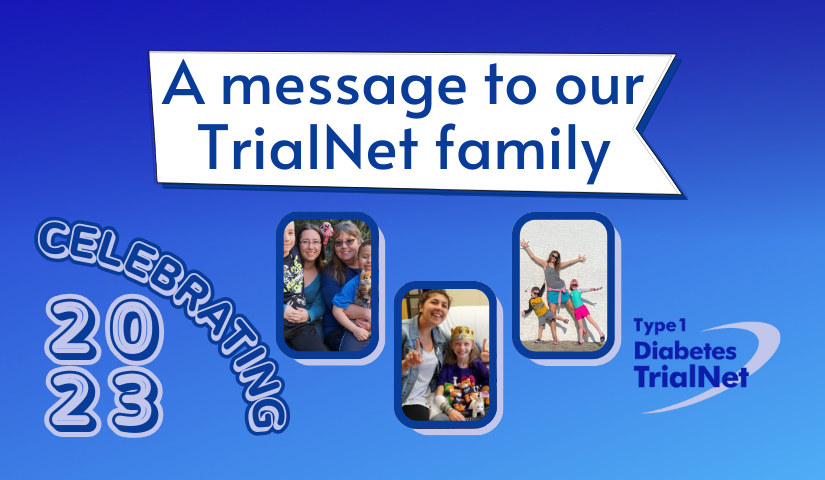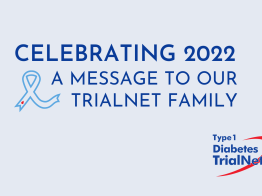
Celebrating a New Era in Type 1 Diabetes Research - A Message from TrialNet Chair Kevan C. Herold, MD
TrialNet Chair Kevan C. Herold, MD, Yale University, reflects on key accomplishments of the past year and shares direction for 2024 and beyond.
Dear TrialNet family,
As we start the new year, I want to take time to recognize TrialNet’s major achievements in 2023 and share our direction for advancing type 1 diabetes (T1D) research in the year ahead.
We accomplished a great deal over the past year, including:
- publishing findings from two major prevention trials and contributing to numerous manuscripts,
- launching two clinical trials and enrolling our first participant in the STOP-T1D study,
- completing enrollment for the TOPPLE study exploring the safety of a new plasmid therapy for the first time in adults with T1D,
- screening nearly 10,000 relatives of people with T1D to determine their risk, and
- presenting at national and international conferences to advance knowledge and collaboration around T1D research.
Our research over the past year confirms the need to build combinations of therapies to extend the positive effects we’ve observed in single therapy studies. For example, findings from the Abatacept Prevention Study, published in the March 2023 issue of Diabetes Care, provided important new information about how the immune therapy abatacept impacts T1D progression. Findings from this study and our rituximab trial, which also showed positive results in people newly diagnosed with T1D, led to the T1D RELAY study. T1D RELAY is currently testing abatacept administered after rituximab, another immune therapy, in people newly diagnosed (Stage 3 T1D). If the T1D RELAY study is successful, we hope to test this combination’s efficacy in prevention of clinical T1D.
We are also testing single therapies that may prove effective in combinations in the future. The JAKPOT T1D study is separately testing two Janus kinase (JAK) inhibitors—abrocitinib and ritlecitinib—in people recently diagnosed with T1D. If either or both are successful at preserving insulin production, we also plan to study them in combination with other treatments or in earlier stages.
While TrialNet primarily focuses on conducting clinical trials, we also contribute samples and data from our clinical trials to ancillary studies looking at ways to advance T1D research beyond the scope of the original trial. For example, data from TrialNet’s Teplizumab Prevention Study was used in an ancillary study that examined the relationship between autoimmunity, the microbiome, and the efficacy of teplizumab. This secondary research is extremely valuable and impacts the direction of future clinical trials.
What’s next?
Because of TrialNet’s accomplishments, we are in a new era for T1D treatment and prevention. As we plan for 2024 and beyond, in addition to evaluating potential therapies and studies, we are looking at new ways to predict risk and expand screening for relatives of people with T1D. We’re also working on ways to improve our ability to identify those at risk for Stage 3 T1D (clinical diagnosis).
We are also focused on broadening our outreach and expanding access to screening. For example, we are partnering with JDRF to encourage underrepresented minorities to participate in research. We are also conducting a qualitative research study to better understand the decision-making process and experiences of clinical trial participants.
None of this would be possible without you.
Whether you are a study participant, family member, TrialNet research team member, or T1D advocate, I want to thank you for making these accomplishments possible. While there is more work to do, we have much to celebrate. As our colleague Dr. Johnny Ludvigsson wrote in an editorial published in the December issue of The New England Journal of Medicine, “…we have promising treatments that may soon be offered to patients with type 1 diabetes at the onset of their disease, and more studies are on their way.”
In the year ahead, I hope you will continue to be involved in advancing T1D research. If you have a relative with T1D and haven’t been screened, I encourage you to set a goal to get screened in 2024. And everyone can help spread the word about TrialNet screening and clinical studies. Each study gets us one step closer to our ultimate goal: A world without T1D.
Kevan C. Herold, MD
TrialNet Chair
CNH Professor of Immunobiology and Medicine, Yale University
TrialNet’s Year in Review
Major accomplishments in 2023 included:
Launched two studies and enrolled our first participant in the STOP-T1D study:
- STOP-T1D is testing low-dose anti-thymocyte globulin (ATG), an immunotherapy, to find out if a 2-day infusion can delay progression of T1D in people at high risk of clinical diagnosis (Stage 3). Those eligible for this study have a 50% chance of clinical diagnosis in two years. A previous TrialNet study of people newly diagnosed with T1D found low-dose ATG preserved insulin production and improved long-term blood sugar control.
- T1D RELAY is testing two established immune therapies—rituximab-pvvr followed by abatacept—to see if the combination can preserve insulin production in people newly diagnosed with T1D. If successful, they may be studied in people at risk (Stage 1 and 2 T1D) to see if they can slow disease progression.
- JAKPOT T1D is separately testing two Janus kinase (JAK) inhibitors-- abrocitinib and ritlecitinib— in people recently diagnosed with T1D. JAK inhibitors are being used and studied in other autoimmune diseases, such as eczema, ulcerative colitis, and rheumatoid arthritis.
Reported findings from two prevention trials:
- Abatacept Prevention Study, Diabetes Care, March 2023, provided important new information about how the immune therapy abatacept impacts T1D progression.
- Hydroxychloroquine (HCQ) Prevention Study, Diabetes Care, November 2023, found HCQ was not effective at slowing T1D progression.
Completed enrollment for the TOPPLE study testing the safety of a new type of plasmid in people recently diagnosed with T1D. We are analyzing the data and look forward to reporting results.
Screened nearly 10,000 relatives of people with T1D to determine risk and identify the early stages of T1D.
Contributed to or published 16 papers and presented at numerous national and international conferences about advances in T1D research.
Offered T1D risk screening at dozens of community events for families impacted by T1D.
Join us in our mission to stop T1D
If you have a family member with T1D, you can benefit from risk screening through the Pathway to Prevention Study. Screening can detect diabetes-related autoantibodies that signal the early stages of T1D years before symptoms appear. TrialNet offers three convenient screening options: an in-home test kit, a test kit to take to a participating lab, or in-person screening at a TrialNet site.
If you’ve been screened outside of TrialNet and had a positive result, you can also contribute to T1D research. TrialNet will confirm your results and let you know about opportunities to participate in clinical trials.
Whether you plan to get screened, visit one of our TrialNet locations, or attend a T1D community event, we look forward to seeing you in 2024!






